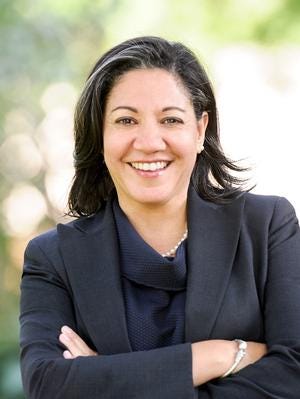
On March 26, Hamilton’s Student Assembly convened for its weekly meeting — this time with a special guest. At the meeting, Dean of Students Terry Martinez gave a presentation to update Assembly members on research she has been conducting during her first year on the Hill.
Martinez disclosed at the start of her presentation that what she was showing the Assembly was an abbreviated version of the presentation she had recently given to the College’s Board of Trustees. The presentation, referred to on the official Student Assembly minutes as a “Presentation and update by Dean Terry Martinez on the State of the College with regard to Student Affairs,” was a six-month review of Dean Martinez’s findings regarding campus culture and what are, in her opinion, the most pressing issues facing the community.
Mental health on campus, a subject that has received recent increased attention from Student Assembly this year, constituted the first part of Dean Martinez’s update. She noted that the school has begun to better codify the processes by which administrators follow up with and assist students of concern. Signs that alert the school to such concerns are a significant number of missed classes, information from resident advisors, or worried phone calls from parents.
Dean Martinez also updated Student Assembly on her concerns with the drinking culture on campus. She became concerned after she saw the number of alcohol transports that took place each weekend. Additionally, she compared data taken from the first-year intake survey and the survey taken at the end of each student’s first year, finding that the percentage of students claiming “frequent beer consumption” at the beginning of of the year rose to from eight percent to 35 percent by the end of the first year on campus. She acknowledged that some increase in alcohol consumption was to be somewhat expected for first-year students, but pointed out that the 35 percent number was much higher in comparison to 27 percent at other schools. She also reported similar data for the “frequently consumed wine or liquor” statistic. “[This] shows me that we have a culture here where we are teaching students to drink,” Martinez said.
Martinez investigated other parts of the campus culture as well. She said that while the collective student sense of belonging was relatively high, this was not the case for many students of color. “Our students of color felt more isolated from campus life. [For students of color] there was that lower sense of belonging, again, which was statistically significantly different. That really reinforced what I heard at the Posse Plus Retreat.”
She concluded that this data made her “want to look more at diversity and inclusion,” adding that while the Office of Admissions is working to diversify the student body, she still has concerns about the culture.
“Our students of color are ready to be at Hamilton, but is Hamilton ready for them? We need to broaden the definition beyond race. When we talk about these issues, I hear it as a black and white issue.” She continued: “For example, I don’t hear about our Asian students or our international students in these conversations. It is polarizing how we are addressing diversity on campus.”
Martinez went on to explain how she is tackling this issue of diversity by utilizing the “multiplicity of experiences that people can bring to campus,” telling the Assembly that the College is working on hiring both a Chief Diversity Officer and Director of the Days-Massolo Center.
Martinez also expounded upon issues of social life and the lack of social spaces on campus, promising to explore such concerns.
She also discussed her worries with the College’s Greek life, particularly regarding hazing.
Specifically, she was concerned about medical transports of students during pledging. She explained how she has been working with students as well as experts and the Inter-Society Council to ensure that Greek life is a safe experience, pointing out that her goal was not to in any way eliminate Greek life, but rather to make it safer and more welcoming.
The last topic she touched on was residential life, stating: “We do not have a residential life model — we have a housing model that has disciplinary layered on top. There is nothing significantly different between the first year and senior year and I want to make sure that we have an experience that students can feel connected to.”
Dean Martinez indicated that these issues came to her attention through extensive conversations with students, staff, and faculty, and she fittingly concluded her presentation with a mention of student involvement.
“One of the best parts of this is that students are engaged in the conversation,” Martinez said. “I want to work with students. I want to explore ideas.”

















